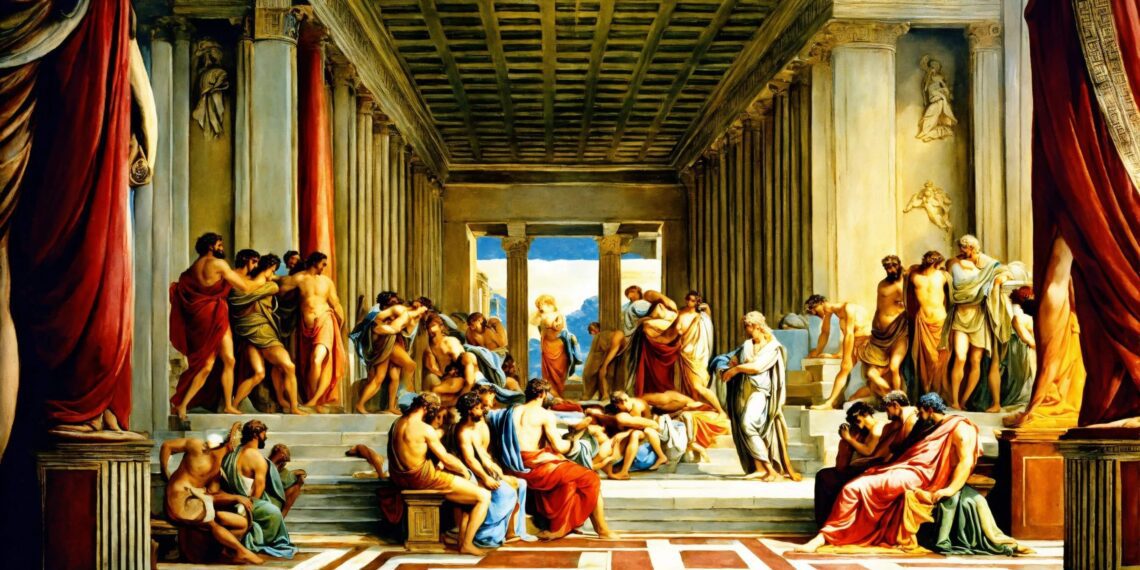Pre Socratic Era
The Pre-Socratic era in philosophy marks a crucial transition from mythological explanations of the world to rational, logical, and scientific inquiry. It is characterized by early Greek thinkers who sought to explain the natural world and its origins through reason, moving away from divine mythologies. These philosophers primarily focused on the nature of the cosmos and the origins of all things, laying the foundation for future philosophical and scientific thought.
The period begins with Thales of Miletus, around 600 BCE, often considered the first philosopher. Thales proposed that water was the fundamental substance of all things. His hypothesis represented a significant shift towards material explanations, a theme that would continue with his successors. Thales' view is often seen as the beginning of Western philosophy because it attempted to explain the world not through myth or religion but through reason and observation.
Thales was succeeded by other thinkers from the Milesian school, such as Anaximander and Anaximenes, who further developed ideas about the fundamental substance of the universe. Anaximander, for example, rejected Thales' idea that water was the origin of all things. Instead, he proposed the concept of the "Apeiron" (the infinite or boundless), which he believed to be the source of all creation. Anaximenes, another Milesian philosopher, theorized that air was the primary substance, demonstrating the variety of explanations that pre-Socratic philosophers offered regarding the fundamental nature of the universe.
These early thinkers set the stage for the philosophical movement that sought to identify the basic building blocks of reality. Their investigations into the nature of matter, change, and the cosmos influenced later developments in both philosophy and science, particularly in the realms of cosmology and metaphysics.
<img src ='https://cms.thepapyrusbd.com/public/storage/inside-article-image/qbx53ooih.jpg'>
A crucial development during the Pre-Socratic era was the philosophical school of Pythagoras, who introduced mathematics as a key tool for understanding the universe. Pythagoras believed that numbers and mathematical relationships were the essence of reality, influencing later developments in both mathematics and philosophy. The Pythagoreans viewed the cosmos as an ordered, harmonious structure, and their ideas were foundational for future scientific and philosophical inquiry.
Another significant figure from this period is Heraclitus of Ephesus, who famously stated that "everything is in flux," emphasizing the perpetual state of change in the universe. Heraclitus believed that the universe is characterized by constant conflict and strife, but this conflict ultimately brings about harmony. He introduced the idea of the Logos, a fundamental principle of order and reason in the universe. His doctrine of change and unity through opposition had a profound impact on later philosophical and theological thought.
In contrast to Heraclitus, Parmenides of Elea argued that change was an illusion and that reality is unchanging and eternal. According to Parmenides, only "Being" exists, and the perception of change is deceptive. His stark contrast to Heraclitus set the stage for later debates between philosophers on the nature of reality, being, and change.
Empedocles and Anaxagoras also made important contributions to the Pre-Socratic tradition. Empedocles introduced the idea of four primary elements—earth, air, fire, and water—asserting that these elements combine and separate through the forces of love and strife. Anaxagoras, on the other hand, introduced the concept of "nous" (mind) as the organizing principle of the cosmos. He suggested that everything contains a part of everything else, and that the cosmos is ordered by the influence of mind.
The Pre-Socratic philosophers were not only concerned with the physical nature of the world but also began to explore the metaphysical and ethical implications of their theories. Their work laid the groundwork for the philosophical questions that would be explored by later philosophers, such as Socrates, Plato, and Aristotle. These early thinkers questioned the nature of existence, change, the universe, and the divine, and their inquiries would shape the course of Western philosophy for centuries.
While the Pre-Socratic philosophers did not achieve the same systematic or comprehensive philosophies as their later successors, their contributions were foundational. They introduced the practice of questioning, observing, and theorizing about the natural world in ways that were independent of religious dogma. Their pursuit of knowledge and understanding set the stage for the intellectual developments that would follow in the classical period of Greek philosophy.
THE MILEASIAN SCHOOL
In ancient Greece, the school established in Miletus founded by the earliest philosophical institution which operated in the region of Asia Minor. Philosophical thought began at this moment by adopting natural explanations in place of both mythological and divine interpretations of the world. The major philosophers of the school include Thales together with Anaximander and Anaximenes. The three philosophers established the Progressive System of philosophy which defines Western history as they first presented the notion that understanding the universe needs rational thought alongside observations and proven scientific methods.
Thales of Miletus (circa 624–546 BCE) receives credit as the initial philosopher among historians. According to him the entire universe emerged from water because everything derives from this elemental substance. By establishing a theory based on naturalistic reasoning Thales introduced an essential change from mythological interpretations to scientific explanations which though considered basic today proved significant at his time. The historical record attributes two major accomplishments to Thales: the creation of geometry after learning it through Egyptian education and his solutions of real-life problems including pyramid height calculation while determining ship distances. Science and philosophy received substantial contributions from him when he demonstrated his practical knowledge through eclipse prediction.
<img src ='https://cms.thepapyrusbd.com/public/storage/inside-article-image/jh5a5b9jp.png'>
Anaximander (610–546 BCE) progressed beyond naturalistic theories when studying the origin of the universe after learning from Thales. Anaximander refuted the idea put forth by Thales about water being the primal substance and he proposed instead the "Apeiron" or "boundless" as the prime constitutive material. For Anaximander the Apeiron functioned as the unlimited source which produced everything while remaining beyond classification as one of the known substances water, air or fire. Anaximander believed that life appeared through the natural progression of simpler organic forms. His work included the first known world map together with theories which explained that the Earth drifts through empty space without any supporting element. As the leading philosopher of the Milesian tradition during its later years.
**Anaximenes** declared that fundamental universal substance must be air. The philosopher argued that all things derived from air before the substance underwent processes that caused condensation and rarefaction. Anaximenes demonstrated his view that Earth exists as a circular flat shape which rests above the divine soul attribute common in air. The physical transformation of matter served as his philosophical advancement of Milesian thought. Anaximenes’ theory about air-driven transformations became a fundamental foundation for later concepts which atomists and Pythagoreans adopted. Their approach to philosophy made the Milesian philosophers notable throughout history because they adopted an entirely new systematic method for inquiry. They left behind myth-based approaches to natural explanations by pursuing explanations through observational methods combined with reason-based reasoning. The performance-based investigative approach developed by Anaximenes constructed the basis for scientific reasoning that later generated systematic western wisdom in Greece.
The intellectual aspects of Greek classical history were significantly affected through the influential ideas that later affected philosophers such as Pythagoras and Heraclitus and Plato. Plato and the Milesians attempted to explain reality and cosmic nature through experimental observation and rational thinking even though they could not establish conclusive results. Scientists consider their research as the defining origin of Western scientific knowledge that led to the development of rational inquiry from myth-based t







Comments